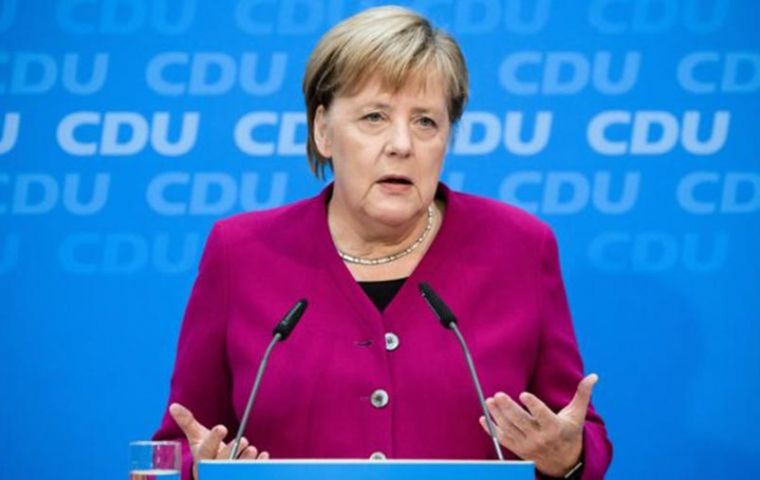MercoPress. South Atlantic News Agency
Extreme right advances in German regional elections deepens ruling coalition division
 Merkel's CDU remained the largest party in Saxony, but saw their share of the vote drop by 7.4 points from the last election in 2014 to 32%
Merkel's CDU remained the largest party in Saxony, but saw their share of the vote drop by 7.4 points from the last election in 2014 to 32% Chancellor Angela Merkel's conservatives and her Social Democrat (SPD) coalition partners bled support to the far right in two state elections in eastern Germany on Sunday, dealing a double blow to her already unstable ruling alliance.
Merkel's Christian Democrats (CDU) remained the largest party in Saxony, but saw their share of the vote drop by 7.4 points from the last election in 2014 to 32 per cent, with the far-right Alternative for Germany (AfD) coming second, an exit poll for broadcaster ARD showed.
The AfD harnessed voter anger over refugees and the planned closure of coal mines in the formerly communist eastern states, casting themselves as the heirs of the demonstrators who brought about the fall of the Berlin Wall three decades ago.
In Brandenburg, which surrounds Berlin, the left-leaning Social Democrats (SPD) clung on to first place in a state they have run since German reunification in 1990, winning 27.5 per cent of the vote - ahead of the AfD on 22.5 per cent.
The setbacks for the ruling parties were not as major as feared but could still hasten the break-up of the national coalition led by Merkel, who has loomed large on the European stage since 2005 and whose early departure would further unsettle a European Union already unnerved by Brexit.
“Now we need to deliver in the autumn,” said Ralph Brinkhaus, leader of the CDU's group in the national parliament.
The next few months will be crucial if the already rocky national coalition is to survive until a federal election due in 2021, with the eastern votes, including a third in Thuringia in October, and the direction of policy both critical.
The parties are due to review the coalition, weakened by rows over migrant policy, tax and pensions, by the year's end. Many SPD members want to quit an alliance that has supported Merkel for 10 of her 14 years in power and rebuild in opposition.





Top Comments
Disclaimer & comment rulesCommenting for this story is now closed.
If you have a Facebook account, become a fan and comment on our Facebook Page!